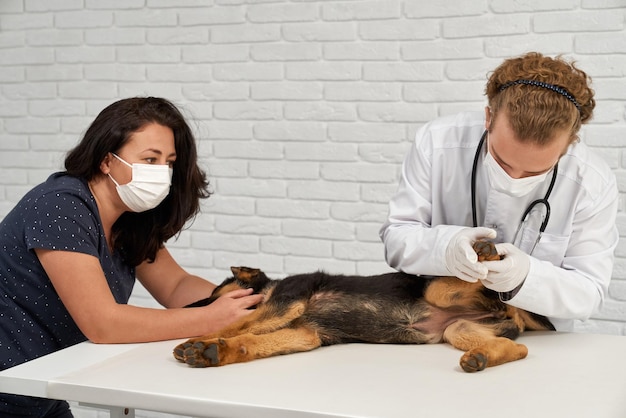Heartworm Testing for Dogs and Cats: What Holly Springs Pet Owners Need


Heartworm Testing for Dogs and Cats: What Holly Springs Pet Owners Need
The thought of heartworm disease in pets is enough to make any Holly Springs pet owner anxious. With our warm, humid climate and active mosquito population, heartworms are a real threat for both dogs and cats in our area. At Grace Animal Hospital, located at 116 Collins Crossing Road, Holly Springs, NC 27540, our veterinary team understands how much you care about your pet’s health. That’s why we emphasize the importance of regular heartworm testing as a vital part of dog and cat parasite prevention.
In this post, we’ll explain why heartworm testing is essential for your pet, how often you should schedule testing, what the process involves, and how you can protect your furry companion year-round. We’ll also answer common questions about heartworm prevention and highlight how our compassionate team supports pet owners across Holly Springs and surrounding communities. By the end, you’ll have a clear understanding of how heartworm testing in Holly Springs can keep your pet healthy and why working with a "vet near me" who prioritizes preventive care truly makes a difference. If you want more details on our service, you can always visit our page dedicated to heartworm testing.
Recognizing the Risks: Signs Your Pet Needs Heartworm Testing
Heartworm disease can be a silent threat, especially in its early stages. Most dogs and cats show few, if any, symptoms at first, which is why routine heartworm testing in Holly Springs is so important. Pet owners might not notice anything unusual until the disease has progressed, making treatment more complicated and the risks much higher.
Symptoms of heartworm disease in dogs often include a persistent cough, lethargy, reduced appetite, or unexplained weight loss. As the condition worsens, you might observe difficulty breathing, fatigue after mild exercise, or a swollen belly from fluid accumulation. Cats present a unique challenge, as their symptoms can be subtle or mimic other illnesses. Signs to watch for in cats are coughing, vomiting, loss of appetite, or sudden collapse.
It’s natural to wonder, “If my pet seems healthy, do they really need testing?” The answer is yes. Mosquitoes can transmit heartworm larvae with a single bite, and even indoor pets are at risk. Our veterinary professionals often see cases where the only clue is a positive test result during a wellness examination. Early detection is your best defense; it allows for prompt intervention and helps ensure your pet’s best chance at a healthy life.
Heartworm Disease in Holly Springs: How It Happens and Why It Matters
Understanding how heartworm disease develops can help you appreciate the importance of preventive care. Heartworm disease is caused by Dirofilaria immitis, a parasitic worm that spreads through the bite of an infected mosquito. Once inside the body, the larvae migrate to the heart, lungs, and blood vessels, where they mature and can cause lasting damage.
With Holly Springs’ warm weather and extended mosquito season, the risk of exposure is present for much of the year. This is why heartworm testing in Holly Springs is recommended on a regular schedule, even for pets who receive preventive medication. No preventive is perfect; missed doses, vomiting after administration, or issues with absorption can leave a window of vulnerability.
Cats are susceptible to heartworm disease too, although they tend to carry fewer worms than dogs. Unfortunately, even a single heartworm can pose a significant threat to a cat’s health. Unlike dogs, there is no approved treatment for heartworm infection in cats, which makes prevention and early detection through testing even more crucial.
Regular heartworm testing, combined with a comprehensive dog and cat parasite prevention program, is the most effective way to ensure your pet’s long-term well-being in this region.
What to Expect: Heartworm Testing and Treatment Options at Grace Animal Hospital
Pet owners often have questions about what heartworm testing involves and what happens if a pet tests positive. At Grace Animal Hospital, our veterinarians use blood tests to detect the presence of heartworm proteins (antigens) or microfilariae in your pet’s system. For dogs, annual heartworm testing is recommended, even if they are on monthly preventives. For cats, testing may be suggested based on lifestyle and risk factors.
During your pet’s visit, our veterinary team will discuss your pet’s history and walk you through the testing process. The test itself is quick, requiring only a small blood sample. Results are typically available during the same appointment, allowing for immediate discussion of next steps.
If a dog tests positive for heartworms, additional diagnostics—such as chest X-rays or ultrasounds—may be recommended to assess the extent of the infection. Treatment for canine heartworm disease involves a carefully managed protocol using medications to eliminate the adult worms and larvae, along with supportive care to reduce complications. Throughout this process, our veterinarians monitor your pet closely and provide detailed guidance for home care and recovery.
For cats, a positive test result is handled differently. Because there is no approved treatment for heartworm infection in cats, our focus shifts to supportive care, monitoring, and prevention of additional infections. We work with you to create a tailored plan that addresses your cat’s unique needs and comfort.
Our pet diagnostic laboratory services in Holly Springs allow us to provide timely, accurate results and ensure your pet receives the care they deserve.
Prevention Is Key: How to Protect Your Pet from Heartworm Disease
The best way to deal with heartworm disease is to prevent it entirely. Our veterinary team emphasizes a year-round approach to dog and cat parasite prevention in Holly Springs and surrounding areas. This involves regular heartworm testing, consistent use of veterinarian-approved preventives, and ongoing communication with your veterinary professionals.
Steps for effective prevention include administering monthly heartworm preventives as prescribed, maintaining an annual or biannual schedule for heartworm testing, and ensuring your pet receives wellness examinations to catch any health issues early. Additionally, keeping your yard free of standing water and minimizing mosquito exposure can help reduce risk, though it is not a substitute for medical prevention.
For cats, it’s important to remember that even indoor felines are at risk; mosquitoes can easily enter homes. Preventive products formulated specifically for cats are available and should be used as part of a comprehensive parasite prevention plan. Our veterinary team can discuss the best options for your household and lifestyle during your pet’s next visit.
When to Schedule a Heartworm Test: Knowing When to See Your Veterinarian
Pet owners sometimes wonder when the right time is to schedule a heartworm test, especially if their pet appears healthy. The American Heartworm Society recommends annual testing for all dogs, regardless of preventive status. For puppies, testing typically begins at around seven months of age, with follow-up tests as advised by your veterinarian. Cats should also be evaluated for heartworm risk, and testing may be suggested based on their exposure and health history.
You should schedule a heartworm test if your pet has missed a dose of preventive, has recently traveled to an area with a high prevalence of heartworm disease, or is showing any concerning symptoms such as coughing, fatigue, or unexplained weight loss. Early detection can make a significant difference in treatment outcomes.
During your visit to Grace Animal Hospital, our veterinarians will review your pet’s health, answer your questions, and help you establish a testing and prevention schedule tailored to your pet’s needs. If you’re searching for a "quality vet near me" or trying to find reliable veterinary services near you, choosing a clinic that prioritizes preventive care and regular screenings is essential for your pet’s health and your peace of mind.
Take Action for Your Pet’s Health: Schedule Heartworm Testing in Holly Springs Today
Every pet deserves the best protection against parasites, and as your trusted veterinary professionals at Grace Animal Hospital, we are committed to helping you achieve peace of mind. Heartworm testing in Holly Springs is a simple step with lasting benefits for your dog or cat. By scheduling routine exams and maintaining a preventive care program, you are giving your pet the healthiest life possible.
If you haven’t scheduled a recent heartworm test or have questions about dog and cat parasite prevention in Holly Springs, we invite you to contact our veterinary team. You can reach us at (919) 346-0285 or visit our heartworm testing page for more details. For those looking for a "vet near me" who truly cares, our clinic at 116 Collins Crossing Road, Holly Springs, NC 27540 is ready to support pets from Holly Springs and surrounding communities.
Remember, early detection saves lives. Schedule your pet’s next heartworm test today and let our veterinary team help you build a comprehensive plan for parasite prevention that fits your family’s needs. We look forward to providing compassionate, expert care every step of the way.
This blog is for informational purposes only and does not replace professional veterinary advice. If your pet is displaying concerning symptoms, please schedule an appointment with your veterinarian for a thorough evaluation.



















